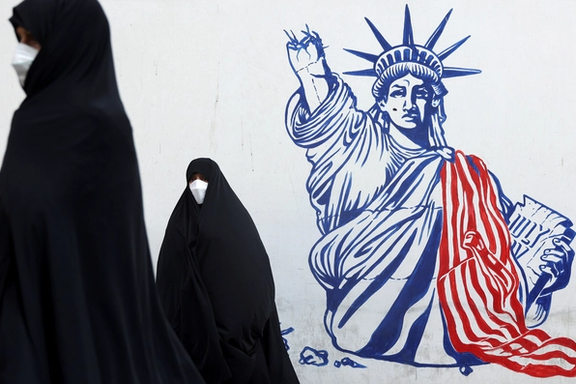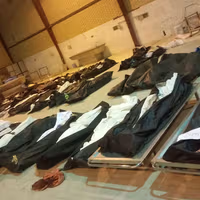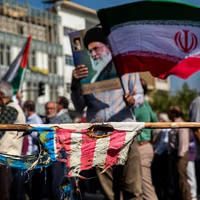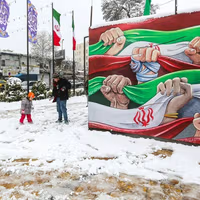Iran's foreign ministry will combat sanctions, top envoy says

Iran’s foreign minister said on Thursday that his ministry aims to soften and counter the effects of UN sanctions reinstated on Iran last month which are expected to deepen economic pain.

Iran’s foreign minister said on Thursday that his ministry aims to soften and counter the effects of UN sanctions reinstated on Iran last month which are expected to deepen economic pain.
“Of course, this does not mean that we will abandon our mission to have the sanctions lifted," Abbas Araghchi told a seminar in the northeastern city of Mashhad on Thursday.
"Rather, alongside that mission, we are pursuing the neutralization and counteraction of sanctions and the fulfillment of the country’s needs — responsibilities that rest with both the government as a whole and the Foreign Ministry.”
The United Nations Security Council reimposed international sanctions on Iran on last month after European powers triggered the “snapback” mechanism under Resolution 2231.
The decision effectively restored all UN sanctions lifted under a 2015 nuclear deal and is expected to deepen Iran’s economic isolation.
“One can only complain about sanctions when all domestic capacities have been fully utilized,” Araghchi added, suggesting that internal failings bear some blame for Iran’s economic doldrums.
Defiant in crisis
President Masoud Pezeshkian on Thursday acknowledged the country’s dire situation, saying: “Japan, South Korea and Turkey have no oil, yet they are better off than Iran. We have oil and gas, and we are hungry.”
Economists have warned that renewed sanctions will likely worsen inflation, accelerate the currency’s decline, and aggravate shortages of essential goods.
Despite growing pressure, Tehran has maintained a defiant tone since the June war with Israel.
On Wednesday, Araghchi said Iran would not return to talks with the United States unless Washington abandons what he called “unreasonable and excessive demands.”
Five rounds of indirect talks, he added, had taken place before US and Israeli strikes on June and that follow-up discussions at the UN General Assembly also collapsed for the same reason.

Iranian President Masoud Pezeshkian said on Thursday there is no doubt that gasoline prices must rise, signaling that long-anticipated fuel reforms are moving closer despite fears of renewed public unrest.
Speaking during a visit to West Azarbaijan province, Pezeshkian acknowledged that raising fuel prices is unavoidable to address Iran’s worsening energy shortages but cautioned that any decision would require “careful planning” to avoid deepening economic hardship.
“There is no question that gasoline must become more expensive,” he said, according to state media. “But it is not a simple decision. We cannot act overnight or create more difficulties for people.”
His comments came amid intensifying debate over Tehran’s plans to introduce a new pricing system aimed at curbing soaring fuel consumption and smuggling.
Over the past two weeks, Iranian media have reported that the government is reviewing several reform scenarios, including multiple pricing tiers and possible changes to fuel quotas.
Last week, Khaneh Eghtesad published what it said was a leaked cabinet decree outlining a roadmap for “gradual correction” of gasoline prices. The government initially denied the report but later confirmed that the issue was under study by cabinet working groups.


Cabinet secretary Kamal Taghavi-Nejad said this week that fuel reform had been discussed but “no final decision” had been taken. A lawmaker, Amirhossein Sabeti, said the debate over introducing three fuel price tiers had become serious in parliament.
Energy officials say domestic gasoline consumption has surged well beyond refining capacity, forcing costly imports and draining subsidies that analysts estimate at more than $30 billion annually.
Pezeshkian has pledged to overhaul Iran’s energy subsidy system, arguing that maintaining the current artificially low prices is unsustainable. “Even water costs more than gasoline in Iran,” he said earlier this week.


The last major fuel price hike in November 2019 sparked nationwide protests that were met with a violent crackdown. Rights groups and Reuters reported that at least 1,500 people were killed.
Officials have since stressed that any future reform would be gradual and paired with compensation measures for low-income households. The administration insists it will not repeat the sudden price shock of 2019.
Economists warn that aligning prices with real production costs could sharply raise inflation but may also help reduce smuggling and waste. The government is expected to unveil its energy reform framework before submitting next year’s budget in December.
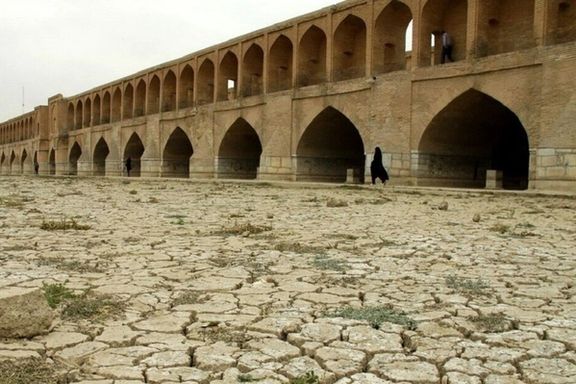
Iran’s city of Isfahan could face a drinking water emergency within 45 days unless immediate action is taken to halt non-potable water extraction and speed up long-delayed transfer projects, the city’s council head warned, as drought deepens a nationwide water crisis.
Mohammad Noursalehi, head of Isfahan’s City Council, told the Iranian Labor News Agency (ILNA) that the Zayandehrud Dam -- the main source of water for central Iran -- is reaching critically low levels.
“If the current trend continues, even drinking water for citizens will be at risk within the next 45 days,” he said.
According to Noursalehi,the dam is releasing several times more water than it receives, and much of that flow never reaches Isfahan’s main treatment plant because a large portion is diverted or lost along the route through both legal and illegal withdrawals.
Five million people at risk
He warned that more than five million people in Isfahan, Yazd, Chaharmahal and Bakhtiari, and Qom provinces depend on the Zayandehrud for drinking, agricultural, and industrial water.
“This is no longer just an agricultural or industrial problem. People’s drinking water is in danger,” he said, calling for the immediate suspension of non-drinking water use.
Noursalehi urged the government to accelerate long-stalled water transfer projects such as the Kouhrang-3 tunnel and the southern Isfahan pipeline, saying that decades of delay had compounded the crisis.
“If these projects had been completed on time, we would not be facing this situation today,” he said.
The council head also warned of severe environmental consequences, noting that the complete drying of the Gavkhouni Wetland -- once a UNESCO-listed ecosystem -- threatens the region’s biodiversity.

Land subsidence is already visible across Isfahan’s plains, Noursalehi said, warning that groundwater depletion has caused the ground to sink in several northern districts, prompting the evacuation of some schools.
“If this continues, Isfahan’s centuries-old monuments could face serious structural threats,” he said.
Officials in Iran have recently acknowledged that 19 major dams across the country are below 20 percent of capacity, with some hydropower plants -- including Tehran’s Amir Kabir Dam -- forced to halt operations.
Environmental researchers say the country is nearing “water bankruptcy,” driven by decades of overuse, unscientific dam-building, and poor water management.
Autumn remains dry, reservoirs at record lows
The first month of autumn passed with almost no rainfall across most provinces, according to the national meteorological organization. Officials said precipitation this year has dropped up to 45% below seasonal averages, leaving many regions facing possible rationing of drinking water.
Ahad Vazifeh, head of the National Center for Climate and Drought Crisis Management, said on Thursday that “no significant rain is forecast for at least the next three weeks,” warning that water shortages in major cities, including Tehran and Isfahan, will persist.
“Even if winter brings above-average rain, it will not compensate for the current deficit,” he said.
Government data show that total water stored in Iran’s 193 main dams has fallen to 17.6 billion cubic meters -- just 34% of full capacity and down nearly a quarter from last year.
Inflows since the start of the new water year have dropped 39%, while the outflow from reservoirs has declined by 29%.
The Zayandehrud dam in Isfahan is now only 13% full, the Lar dam near Tehran 2%, and the Independence dam in Hormozgan 6%, according to the Energy Ministry.
Many southern and central reservoirs have reached “dead storage” levels, rendering water unusable for supply or power generation.
Experts say Iran’s worsening drought, coupled with climate change and policy missteps, is transforming water shortages into a potential national security concern. Hundreds of villages now rely on water deliveries by tanker, while protests over shortages have erupted periodically in several provinces.

As Iranian consumers grapple with inflation and shortages, the country’s mid-tier car market which is dominated by Chinese automakers faces growing uncertainty following the renewal of UN sanctions in September.
“With the return of UN Security Council sanctions and the exposure of sanction-evasion methods, will Chinese automakers still be willing to operate in Iran?” the business daily Donya-ye-Eqtesad asked this week.
The share of private automakers in Iran’s car market has tripled over the past eight years, according to a recent parliamentary report, driven largely by Chinese partnerships.
But the reactivation of the UN “snapback” mechanism and renewed Western pressure have cast doubt on their long-term presence. If Chinese firms were to withdraw, the market could face severe disruption.
Chinese automakers increasingly rely on barter trade to skirt US restrictions, according to a Bloomberg report, with vehicles and auto parts shipped to Iran in exchange for copper and zinc.
Factories under strain
Iran’s automotive “pyramid” places domestic models at the base, Chinese-assembled cars in the middle, and high-end imports at the top. Losing the middle tier could trigger sharp price increases across all segments.
The auto-news site Pedal reported last month that several Chinese automakers have instructed their Iranian partners to lay off about 30 percent of production-line staff and to suspend both cash and installment sales.
The industry also fears further price hikes as the rial continues to slide against the dollar.
Parts shortages have deepened the malaise.
Economist Albert Baghzian of Tehran University told the government-run Iran newspaper: “Visit any Chinese car dealership today and the first thing you hear is, ‘We have no parts, we’re sanctioned.’”
To cushion the blow, major assemblers such as Kerman Motor (which produces Chery’s Tiggo line), Iran Khodro (Haima), and Saipa/Pars Khodro (Brilliance) are rebranding Chinese models, working with smaller firms less exposed to sanctions.
Flashy but distrusted
Vehicle imports are restricted and tightly controlled.
Prices of imported cars cannot exceed $35,000, and only a few models—from Changan, DFM, Geely, Haima, Kia, Hyundai and several Chinese SUVs—have entered the market.
Some Korean and Japanese brands like Toyota, Kia and Mazda reach Iran through free-trade zones, but European and American models such as Mercedes-Benz, BMW, Peugeot and Ford remain largely absent.
Middle-class buyers praise the design and technology of Chinese cars compared with domestic models from Iran Khodro and Saipa. Reza, a shop owner in Tehran’s Grand Bazaar, quipped they were like “a fake Rolex: flashy, but unreliable.”
He told Iran International that while Chinese SUVs have improved, many owners report problems after 30,000 to 40,000 kilometers, including rattling cabins and gearbox failures.
“The market still doesn’t trust them,” he added.
In inflation-hit Iran, where cars serve as a store of value, that perception carries weight.
One user on X wrote, “A 2024 Chinese-made Toyota Corolla sells for 2.7 billion tomans and finds no buyers, while a 2015 Japanese-made Corolla with an unknown history is listed for 3 billion! Once you drive both, the quality gap is obvious.”

Iran's foreign minister said on Wednesday it will not return to negotiations with the United States unless Washington abandons what it described as unreasonable and excessive demands.
Abbas Araghchi told reporters in the northeastern city of Mashhad that Iran remained committed to diplomacy but would not compromise on its national rights.
He said five rounds of indirect talks with Washington had taken place before the 12-day conflict in June that saw US and Israeli strikes on Iranian nuclear facilities and that subsequent discussions on the sidelines of the UN General Assembly also failed due to US demands.
“This year, after five rounds of negotiations, the United States joined Israel’s military attack against Iran. Later, in New York, there was also an opportunity for a reasonable, mutually beneficial agreement -- but once again, the talks failed because of America’s excessive demands,” he said.
He added, “As long as the Americans persist in their policy of overreach and continue to make unreasonable demands, we will not return to the negotiating table.”
“Iran has always shown that it believes in peace and diplomacy,” Araghchi emphasized. “Wherever the country’s interests can be secured through dialogue, we will not hesitate to act. But the other side has repeatedly proven it does not adhere to diplomacy.”
The comments came as Araghchi arrived in Mashhad to attend a two-day regional diplomacy conference alongside senior Iranian officials, business leaders, and ambassadors to neighboring and Asian countries.
Earlier in the day, the foreign ministry spokesperson said Iran must rely on both its missile capabilities and diplomacy to safeguard national interests.
Speaking earlier in the day in the same city, Esmail Baghaei said: “We must use all tools to protect the country’s rights -- whether through missiles or diplomacy and negotiation.”
The collapse of the talks followed months of rising tension over Iran’s nuclear and missile programs, compounded by the reimposition of UN sanctions under the 2015 nuclear deal’s snapback mechanism.
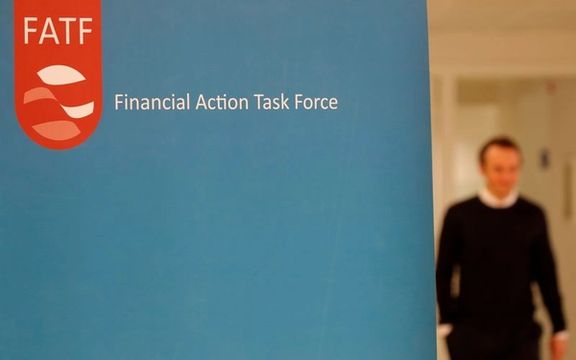
Iranian President Masoud Pezeshkian has signed into law the country’s conditional accession to the United Nations Convention for the Suppression of the Financing of Terrorism (CFT), approving it only within the limits of Iran’s constitution and domestic legislation.
In a formal decree on Tuesday, Pezeshkian instructed the judiciary, the ministries of interior, intelligence, justice, foreign affairs, and economy, as well as the Central Bank, to implement the law in accordance with national regulations -- a condition that could limit its impact even as Tehran seeks to ease its isolation from the global financial system.
Under conditions set by parliament and endorsed by the Expediency Council, Iran will act “within the framework of the constitution,” and in cases where any provision of the convention conflicts with national laws, “domestic legislation will take precedence,” council spokesman Mohsen Dehnavi said.
The move, which follows years of political wrangling, comes just a day before the Financial Action Task Force (FATF) plenary in Paris on October 22–24, where delegates from over 200 jurisdictions will discuss mutual evaluations and global efforts to combat money laundering and terror financing.
Iran’s Financial Intelligence Unit chief, Hadi Khani, has traveled to Paris to attend FATF plenary for the first time in six years at the group’s official invitation, according to state media.
Khani, who also serves as deputy economy minister and secretary of Iran’s Anti–Money Laundering and Counter-Terrorist Financing Council, is expected to outline Iran’s progress on its action plan, focusing on the recent approval of its accession to the UN Palermo Convention against transnational organized crime.
The Iranian delegation will brief FATF members on legislative and implementation steps and coordinate future meetings to address questions and clarify outstanding issues, IRNA reported.
In May, Iran’s Expediency Council, conditionally approved the country’s accession to the Palermo Convention, one of the two key legislative items tied to the FATF standards, alongside the CFT.
The Expediency Council, overseen by Supreme Leader Ali Khamenei, mediates disputes between parliament and the Guardian Council, a body that vets laws and candidates.
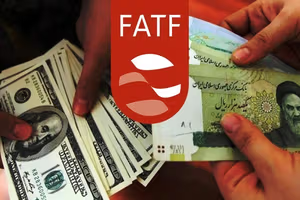
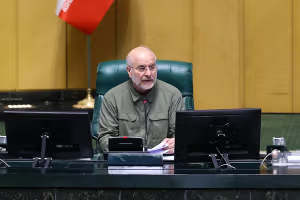
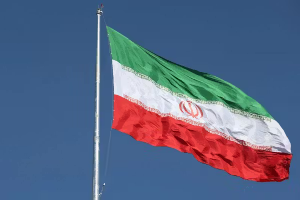
Supporters say joining the UN convention could help Iran align with FATF standards, reconnect with global banking systems, and attract investment, while hardliners warn it risks exposing financial channels used to evade US sanctions and fund regional allies.
Parliament Speaker Mohammad Bagher Ghalibaf sent the bill to Pezeshkian for implementation under Article 123 of the constitution last week after lawmakers rejected a conservative-backed motion to block the move, clearing the way for Iran to finalize its accession.
Iran and North Korea remain the only two countries still outside the FATF framework.
